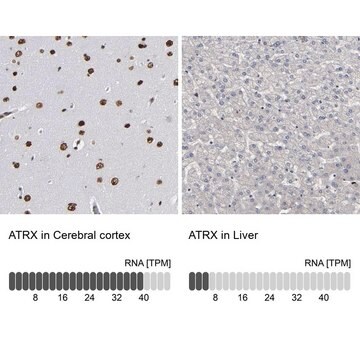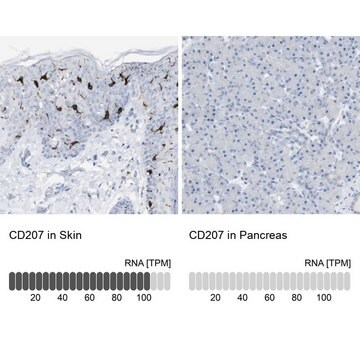254M-1
FLI-1 (MRQ-1) Mouse Monoclonal Antibody
About This Item
Productos recomendados
biological source
mouse
Quality Level
100
500
conjugate
unconjugated
antibody form
culture supernatant
antibody product type
primary antibodies
clone
MRQ-1, monoclonal
description
For In Vitro Diagnostic Use in Select Regions (See Chart)
form
buffered aqueous solution
species reactivity
human
packaging
vial of 0.1 mL concentrate (254M-14)
vial of 0.5 mL concentrate (254M-15)
bottle of 1.0 mL predilute (254M-17)
vial of 1.0 mL concentrate (254M-16)
bottle of 7.0 mL predilute (254M-18)
manufacturer/tradename
Cell Marque™
technique(s)
immunohistochemistry (formalin-fixed, paraffin-embedded sections): 1:25-1:100
isotype
IgG2b
control
pnet
shipped in
wet ice
storage temp.
2-8°C
visualization
nuclear
Gene Information
human ... FLI1(2313)
General description
The FLI-1 gene and FLI-1 protein are best known for their critical role in the pathogenesis of ES/PNET. More than 85% of ES/PNET are characterized by the translocation t(11;22)(q24;q12) that results in the fusion of the ews gene on chromosome 22 to the FLI-1 gene on chromosome 11. FLI-1 is a member of the ETS (erythroblastosis virus-associated transforming sequences) family of DNA-binding transcription factors and is involved in cellular proliferation and tumorigenesis. FLI-1 is normally expressed in endothelial cells and in hematopoietic cells, including T lymphocytes. The immunohistochemical detection of FLI-1 protein has been shown in two recent studies to be valuable in the discrimination of ES/PNET from most of its potential mimics, with the notable exception of lymphoblastic lymphoma.
The FLI-1 gene has also recently been shown to play an important role in the embryologic development of blood vessels. Expression of FLI-1 protein in adult endothelial cells in all types of blood vessels (arterial, venous, and lymphatic) has previously been shown both in our previous work and in that of Nilsson et al.
Folpe et al. found FLI-1 to be a highly sensitive (92%) and, with regards to the cases evaluated in this study, specific (100%) marker of both benign and malignant vascular tumors. The “absolute specificity” of FLI-1 is of course lower, given its expression in ES/PNET and lymphomas. FLI-1 expression appears to be the first reliable nuclear marker of endothelial differentiation. In particular, Folpe et al. found that FLI-1 reliably distinguished epithelioid forms of angiosarcoma from two important mimics, epithelioid sarcoma and carcinoma.
Assoc. products: WT-1, CD99, Synaptophysin, Chromogranin A, CK AE1/AE3
Quality
 IVD |  IVD |  IVD |  RUO |
Linkage
Physical form
Preparation Note
Other Notes
Legal Information
¿No encuentra el producto adecuado?
Pruebe nuestro Herramienta de selección de productos.
control
Elija entre una de las versiones más recientes:
Certificados de análisis (COA)
¿No ve la versión correcta?
Si necesita una versión concreta, puede buscar un certificado específico por el número de lote.
¿Ya tiene este producto?
Encuentre la documentación para los productos que ha comprado recientemente en la Biblioteca de documentos.
Nuestro equipo de científicos tiene experiencia en todas las áreas de investigación: Ciencias de la vida, Ciencia de los materiales, Síntesis química, Cromatografía, Analítica y muchas otras.
Póngase en contacto con el Servicio técnico





